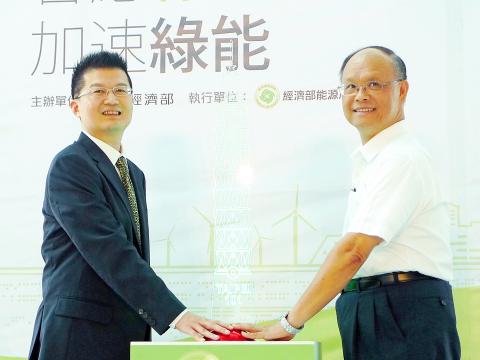Taipei Financial Center Corp (TFCC, 台北金融大樓公司), which operates the Taipei 101 skyscraper, yesterday said it plans to spend between NT$50 million and NT$60 million (US$1.6 million and US$1.9 million) to replace all the traditional fluorescent tubes on the skyscraper’s external walls to LED lighting in the next three years as part of its efforts to conserve energy.
The company’s remarks came after purchasing 1.01 million kilowatt-hours (kWh) of “green” power — which cost NT$1.07 million more than traditional power sources — from state-run Taiwan Power Co (Taipower, 台電) in April, increasing the consumption of energy generated from renewable resources.
“Taipei 101 will not always be the tallest green building in the world, but we are trying to become the paragon for global green buildings,” Taipei 101 president Chou Te-yu (周德宇) told a press conference, referring to the firm’s pledge to conserve energy and reduce carbon dioxide emissions.

Photo: CNA
Chou said the purchase of 1.01 million kWh of green power would meet the electricity demand for the lighting of the skyscraper’s external walls for one year.
Apart from the purchase of green power and the planned replacement using LED lighting, the company is considering increasing the number of solar panels installed, Taipei 101 spokesperson Michael Liu (劉家豪) said.
Last week, Taiwan Semiconductor Manufacturing Co (台積電) said it would buy 100 million kWh of green power, accounting for almost 13 percent of what Taipower could offer this year, while I-Mei Foods Co (義美) said it would purchase 2.5 million kWh of green power.
The amount of green power that had been purchased by enterprises and individuals totaled 119 million kWh in the first half of this year, up 27 times from the same period of time last year, Minister of Economic Affairs John Deng (鄧振中) said.
Deng said that the purchase of 119 million kWh of green power is expected to reduce nearly 60 million kilograms of carbon footprint, equivalent to the carbon absorbed by 6 million trees in one year.
In an attempt to encourage more enterprises and individuals to buy electricity generated from renewable resources, Deng said the government reduced the green power price to NT$1.06 per kWh from last year’s NT$2.64 per kWh.
Deng said the government plans to increase power contribution from renewable energy resources from this year’s 11.6 percent to more than 25 percent by 2030 to diversify the nation’s energy resources and contain the rising risk of power shortages.

Hon Hai Precision Industry Co (鴻海精密) yesterday said that its research institute has launched its first advanced artificial intelligence (AI) large language model (LLM) using traditional Chinese, with technology assistance from Nvidia Corp. Hon Hai, also known as Foxconn Technology Group (富士康科技集團), said the LLM, FoxBrain, is expected to improve its data analysis capabilities for smart manufacturing, and electric vehicle and smart city development. An LLM is a type of AI trained on vast amounts of text data and uses deep learning techniques, particularly neural networks, to process and generate language. They are essential for building and improving AI-powered servers. Nvidia provided assistance

DOMESTIC SUPPLY: The probe comes as Donald Trump has called for the repeal of the US$52.7 billion CHIPS and Science Act, which the US Congress passed in 2022 The Office of the US Trade Representative is to hold a hearing tomorrow into older Chinese-made “legacy” semiconductors that could heap more US tariffs on chips from China that power everyday goods from cars to washing machines to telecoms equipment. The probe, which began during former US president Joe Biden’s tenure in December last year, aims to protect US and other semiconductor producers from China’s massive state-driven buildup of domestic chip supply. A 50 percent US tariff on Chinese semiconductors began on Jan. 1. Legacy chips use older manufacturing processes introduced more than a decade ago and are often far simpler than

STILL HOPEFUL: Delayed payment of NT$5.35 billion from an Indian server client sent its earnings plunging last year, but the firm expects a gradual pickup ahead Asustek Computer Inc (華碩), the world’s No. 5 PC vendor, yesterday reported an 87 percent slump in net profit for last year, dragged by a massive overdue payment from an Indian cloud service provider. The Indian customer has delayed payment totaling NT$5.35 billion (US$162.7 million), Asustek chief financial officer Nick Wu (吳長榮) told an online earnings conference. Asustek shipped servers to India between April and June last year. The customer told Asustek that it is launching multiple fundraising projects and expected to repay the debt in the short term, Wu said. The Indian customer accounted for less than 10 percent to Asustek’s

Gasoline and diesel prices this week are to decrease NT$0.5 and NT$1 per liter respectively as international crude prices continued to fall last week, CPC Corp, Taiwan (CPC, 台灣中油) and Formosa Petrochemical Corp (台塑石化) said yesterday. Effective today, gasoline prices at CPC and Formosa stations are to decrease to NT$29.2, NT$30.7 and NT$32.7 per liter for 92, 95 and 98-octane unleaded gasoline respectively, while premium diesel is to cost NT$27.9 per liter at CPC stations and NT$27.7 at Formosa pumps, the companies said in separate statements. Global crude oil prices dropped last week after the eight OPEC+ members said they would